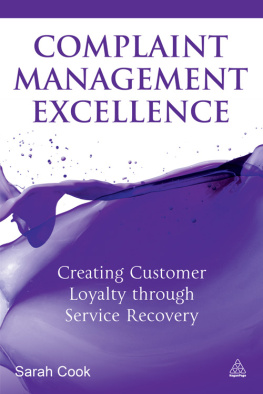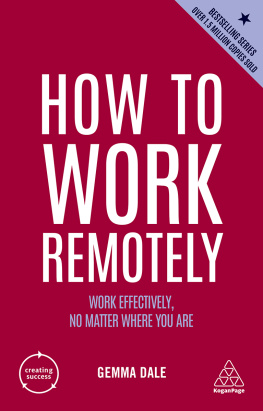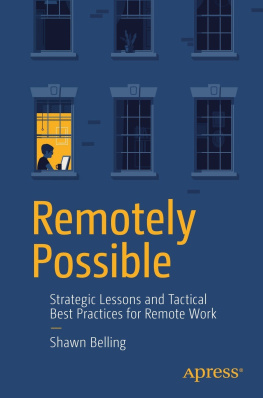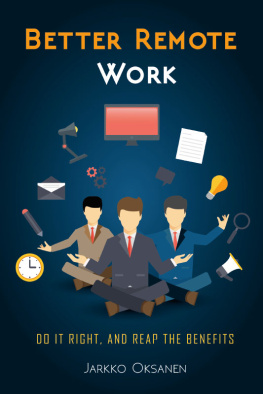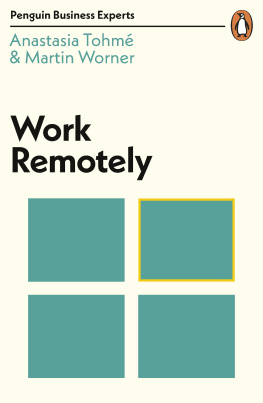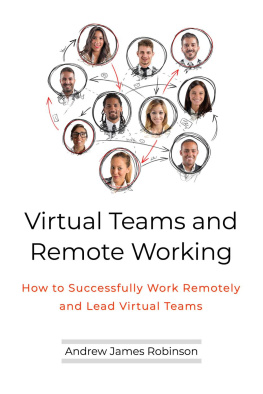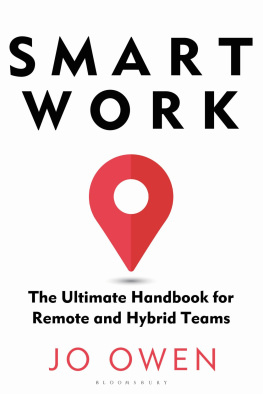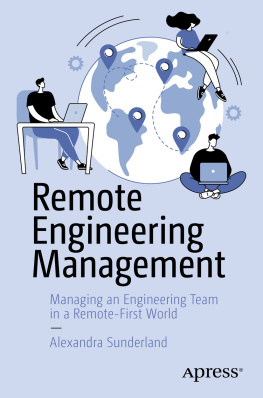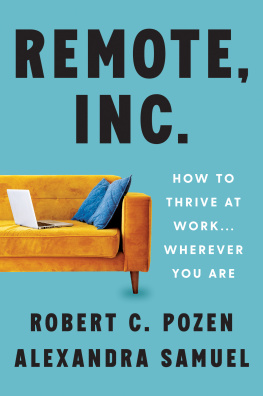Making a success of managing
and working remotely
Making a success of
managing and working
remotely
SARAH COOK

Every possible effort has been made to ensure that the information contained in this book is accurate at the time of going to press, and the publisher and the author cannot accept responsibility for any errors or omissions, however caused. Any opinions expressed in this book are those of the author, not the publisher. Websites identified are for reference only, not endorsement, and any website visits are at the readers own risk. No responsibility for loss or damage occasioned to any person acting, or refraining from action, as a result of the material in this publication can be accepted by the publisher or the author.
Apart from any fair dealing for the purposes of research or private study, or criticism or review, as permitted under the Copyright, Designs and Patents Act 1988, this publication may only be reproduced, stored or transmitted, in any form, or by any means, with the prior permission in writing of the publisher or, in the case of reprographic reproduction, in accordance with the terms of licences issued by the Copyright Licensing Agency. Enquiries concerning reproduction outside those terms should be sent to the publisher at the following address:
IT Governance Publishing Ltd
Unit 3, Clive Court
Bartholomews Walk
Cambridgeshire Business Park
Ely, Cambridgeshire
CB7 4EA
United Kingdom
www.itgovernancepublishing.co.uk
Sarah Cook 2019
The author has asserted the rights of the author under the Copyright, Designs and Patents Act, 1988, to be identified as the author of this work.
First published in the United Kingdom in 2019 by IT Governance Publishing.
ISBN 978-1-78778-130-6
PREFACE
This book is aimed at managers and team members who are about to or have already started working remotely. It will help you learn the best ways to ensure remote working is a success.
Technology has enabled the number of remote workers to rise rapidly in recent years; the TUC estimates that the number of UK people working from home increased by a fifth in the ten years to 2018, and now stands at around 2.5 million people. Thanks to changing attitudes and ever-improving IT network capabilities, this number is expected to continue its upward trajectory over the next five years, with half the UK workforce expected to be working remotely by 2025. However, this new way of working presents both benefits and issues for managers and team members alike.
For the manager, this book provides practical advice on how to manage remotely, with emphasis on the use of technology, creating team cohesion and avoiding isolation factors.
For the team member, the book provides tips and techniques on how to work remotely, balance work and outside-work demands, and deliver desired outcomes.
Whenever working patterns change or are about to change, there follows a period of transition and potential discomfort before new ways of working become the norm. Through reading this book, you will also gain an understanding of coping mechanisms to effectively manage change.
Sarah Cook
Managing Director: The Stairway Consultancy Ltd
www.thestairway.co.uk
.
ABOUT THE AUTHOR
Sarah Cook is the managing director of The Stairway Consultancy Ltd. She has 20 years consulting experience specialising in leadership and management development. Prior to this, Sarah worked for Unilever and as Head of Customer Care for a retail marketing consultancy.
Sarah has practical experience helping managers to manage remotely and create high-performing teams. She has also worked extensively with team members to help them effectively transition to new ways of working. Sarah is a business author and has written widely on the topic of leadership, management development, team building and coaching. She also speaks regularly at conferences and seminars on these topics.
Sarah is a Fellow of the Chartered Institute of Personnel and Development and is a Chartered Marketer. She has an MA from the University of Cambridge and an MBA from The Open University. Sarah is an accredited user of a wide range of psychometric and team diagnostic tools.
For more information about The Stairway Consultancy, please see:
www.thestairway.co.uk; or
Contact .
ACKNOWLEDGEMENTS
I would like to thank Laura Jane Scholes; remote ESL teacher, and James Webb; channel operations and marketing manager, for their time and helpful comments during the review process.
This book is based on best practice guidelines for managing and working remotely. The following organisations were a valuable source of reference:
Working Families
www.workingfamilies.org.uk/article-categories/flexible-working/.
Health and Safety Executive
www.hse.gov.uk/pubns/ck1.htm.
The Advisory, Conciliation and Arbitration Service (Acas) Handling in a reasonable manner requests to work flexibly
www.acas.org.uk/media/pdf/g/r/11287_CoP5_Flexible_Working_v1_0_Accessible.pdf.
Chartered Institute of Personnel Development
www.cipd.co.uk.
DISCLAIMER
All names quoted in this book are fictitious and have been presented for learning, understanding and explaining purposes only.
CONTENTS
CHAPTER 1: BENEFITS OF REMOTE WORKING
The rise in remote working
The world of work is changing. Many employees no longer hold the traditional nine-to-five job. Instead, working time is increasingly flexible. The sophistication of todays technology means that businesses are no longer limited to specific geographical locations to manage their workforce. Technology is the primary enabler of flexible and remote working, allowing employees to change the locations they work from and their working hours. With high-speed connectivity and the right technology, people can now work not only from dedicated office locations but from their homes, a caf or hub, shared working spaces or, indeed, anywhere in the world.
More people are working remotely
Both in the US and Europe, more people are now working remotely. In the US, Gallups 2017 State of the American Workplace report found that between 2012 and 2016 there was a 4% increase in the number of employees working remotely from 39% to 43% of the workforce and a 7% increase in the number of employees working partially remotely.
In Europe, a 2018 study by serviced office provider IWG found that 70% of professionals work remotely at least one
Skills shortage is driving remote working
Hiring people with the right skills, knowledge and experience has become increasingly important to the long-term success of organisations. In freelancing website Upworks 2018 Future Workforce Report, 52% of hiring managers reported that a skills shortage was driving more flexible working. In order to hire the best people, in-company recruiters anticipate that up to a third of their full-time staff will be working remotely in the next decade. They report that hiring people with the right skills is more important than hiring people who can work in the same office location.
Next page

